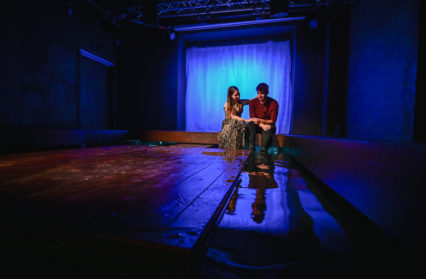Zoe Kramer reviews Huno, a production from The Other Room by Tamar Williams, interweaving Welsh and English folklore in a single story.
Huno, the debut play of playwright Tamar Williams, begins in the same place where its audience emerges from: a pub. In fact, that isn’t the only reason the play is well-suited to its home in The Other Room theatre at Porter’s. The intimate space and the simple yet effective set design incorporating a pool of water around a central platform (prospective audience members should be aware that there is a splash zone!) both support Williams’ script marvelously. The play follows lovers Branwen and Math from their first meeting to a troubled and tumultuous marriage. The darkness of the play unfurls so slowly that one almost doesn’t see it coming — a doom scroll and obsession with the news morphs into deep existential dread and dangerous political activism. Their relationship, touchingly sweet and loving to start with, begins to spiral out of control.
The bilingual aspect of the play adds immeasurably to the story. Branwen speaks Welsh throughout, at first to flirt with Math and to teach him small phrases in the budding stage of their relationship. However, as tensions rise, Math begins to resent her for speaking in a language he doesn’t understand, and for speaking it to their son. As a result, speaking Welsh becomes an act of defiance for her. Williams’ script was in good hands with director Dan Jones, whose staging of the play captured Branwen’s abstract and imaginative way of thinking. She often ponders what her life would look like when seen from above, and Jones plays with this subversion of perspective in interesting ways. His use of shadow and silhouette with the curtain backdrop also added dimension to the story, allowing for the actors to be separated from one another even in a very small space.
Actors Lowri Izzard and David Craig both outdid themselves in these roles, with powerful onstage chemistry, leaning into the moments of emotional tension. Their use of the water onstage was also commendable. It could have easily become gimmicky, but instead was incorporated into the characters’ individual arcs to great effect. It is fascinating to watch not only how the characters relationships develop with one another, but also how their relationship with the water progresses. The play deals with dark themes, including war, death, and domestic violence. Content warnings have been issued accordingly for the production. These themes are certainly not trivialised or used for shock value. Rather, Huno strikes a good balance, addressing these issues with nuance and maturity, while at the same time not numbing or censoring them.
Huno is a captivatingly tender play, bridging the gap between myth and politics, love and violence. It interrogates what it means to belong to a land, and what truly makes a home. While asking these timeless questions, it is also a story of modernity. What happens when a person is given a feed of exclusively negative information? When it seems like the world is falling apart, do you watch the destruction or look away?
Huno is running at The Other Room until the 31st of July. Find out more information here.











